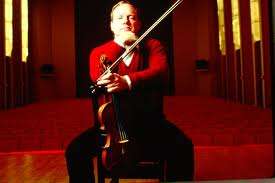|
Back
Four Strings, Ten Fingers New York
BargeMusic, Old Fulton Street, Brooklyn
09/28/2012 -
Masterworks Series: Bach/Carter/Bartók
Johann Sebastian Bach: Violin Sonata Nr. 1, BWV 1001
Elliott Carter: Statement: Remembering Aaron – Rhapsodic Musings – Riconoscenza per Goffredo Petrassi – Fantasy: Remembering Roger
Béla Bartók: Sonata for Solo Violin, sz. 117
Gregory Fulkerson (Violin) 
G. Fulkerson (© Courtesy of the Artist)
For a purportedly austere recital of solo violin music, the reception for Gregory Fulkerson at BargeMusic last night was most unlikely. Cheers, joyous clapping, hands waving “Hi!” and friendship.
On second thought, this was to be expected. Besides his renown as a “fiddler’s fiddler” and an arch champion of American music, Mr. Fulkerson is a most revered teacher, not only at Oberlin Conservatory but at festival around the world. These salvos undoubtedly came from his students and colleagues over the years. And as the recital showed, they were well deserved.
For even in a concert relying on four strings and ten fingers, nothing could have been facile here. The composer–J. S. Bach, Elliott Carter and Béla Bartók–are not always crowd pleasers. Then, too, the imaginative mind which alternated movements of Carter with Bach could have been an arduous challenge.
Gauging those program choices was one thing. But hearing Mr. Fulkerson play his 1774 Guadagnini fiddle was another. Many a violinist prefer the Guadagnini to the Strad, and one could see why in BargeMusic. The sound is so rich, so resonant that it makes listening an unchallenging joy. Added to this was Mr. Fulkerson’s easy-going technique. Not the most difficult series of sounds in the Carter, the Bach presto or the intricate Bartók was anything but anything but...well, effortless.
I hate to use that word, knowing exactly how much effort and experience has gone into the performance. But Mr. Fulkerson does make the most complex counterpoint (and the Carter pyrotechnics in his Roger Sessions homage seem impossible) was a festive celebration of violin playing.
Writers would like to describe Mr. Fulkerson’s long reaches, the Augean tasks of simultaneously playing a glissando, a pizzicato and a melody at once. Or a Bach triple-stop without a curved bow... But Mr. Fulkerson denied us this pleasure. His music was brilliant without strain, without an iota of showing how actually difficult it could be.
Playing Bach and Carter together as a single eight-movement piece for the first half was not as unorthodox as it sounds. The four Bach movements were all from the same First Sonata, the Carter were four “lauds” written for composers with whom he was close. Besides, Bach and Carter have music which is so convincing in its craft (yes, craft!) that the artistry shone out.
The Carters were all new to me, but I loved the way the composer used the spiky open harmonies with the Copland “Remembrance” and the alteration of humor and violence in the Sessions work. But selecting individual works is wrong, for Mr. Fulkerson gave the entire first half an elation of fingering and tone.
The second-half Bartók Solo Violin Sonata, written for Yehudi Menuhin, brings me back several decades to a Menuhin perfromance–in Bangkok.
I had interviewed him that afternoon sitting outside the Oriental Hotel by the Chao Phyra River, a gorgeous hour. That night, at a Royal Command Performance he was to play the Bach First Sonata, a solo partita and the Bartók. This, for an audience which, frankly, wouldn’t know Bach from Bebop. Discreetly–very discreetly for this saintly artist–I hinted that perhaps–just perhaps–the audience might be expecting more than a solo violinist on stage, that they might get a wee bit antsy with one violin for two hours.
He smiled. “Harry,” he said, “that could be true. But I don’t think so.”
It goes without saying that the audience was hypnotized, for Mr. Menuhin’s ethereal personality and playing overwhelmed any cultural differences. I was (rightly) humiliated.
Mr. Fulkerson’s performance was not as austere, not as ethereal as that of Mr. Menuhin. The opening chaconne was played with due reverence, but the violinist, as in all his music, was more open, flexible, the Bartók “tunes” blazed with joy, and the piece was less homage the violin, than a sunny celebration of music itself.
Harry Rolnick
|